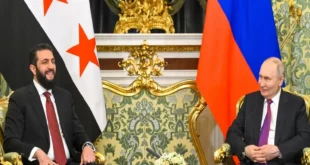CRAWFORD, Texas (Reuters) — President George W. Bush met with top advisers at his Texas ranch on Thursday to hash out a new Iraq strategy that he plans to unveil next month to an American public weary of the war.
Vice President Dick Cheney, Defence Secretary Robert Gates, Secretary of State Condoleezza Rice, Gen. Peter Pace, chairman of the joint chiefs of staff, and national security adviser Stephen Hadley attended the session.
Bush will make a statement to reporters at about 12:30pm EST (1730 GMT), the White House said.
As criticism mounts over his handling of the war, among the options Bush has been considering is a short-term “surge” in US forces to help contain rampant violence. There are currently 134,000 US troops in Iraq.
The Pentagon announced on Wednesday it would send about 3,500 troops to Kuwait to serve as a standby force for use in Iraq or elsewhere in the region.
Democrats say November elections in which they took control of Congress from Bush’s Republican Party reflected public discontent with the Iraq war and desire for change.
But Bush, who prides himself on sticking to decisions, has brushed aside a proposal from a bipartisan panel to ask US foes Iran and Syria for help in stabilising Iraq and is said to be looking closely at a temporary troop increase.
Sen. Joseph Biden, the Delaware Democrat who will be the next chairman of the Senate Foreign Relations Committee, and other Democrats already have expressed opposition to a troop increase.
John Edwards, the Democratic vice presidential candidate in 2004 who now says his vote for the Iraq war was a mistake, called for the United States to begin withdrawing troops rather than “escalating” the conflict by sending more troops.
Edwards, a former North Carolina senator who on Thursday announced his bid for the presidency in 2008, said the problem in Iraq was “not one that’s susceptible to a military solution.” The White House suggested Democrats and other critics should hold their fire until they hear Bush’s recommendations.
“I hope that Senator Biden would wait to hear what the president has to say before announcing what he’s opposed to,” spokesman Scott Stanzel said.
“President Bush will talk soon to our troops, to the American people and to the Iraqi people about the new way forward in Iraq that will lead to a democratic and unified country that can sustain, govern, and defend itself,” he said.
Former Republican president Gerald Ford, who died on Tuesday, said in a 2004 interview embargoed until after his death that he thought Bush and his top advisers made a “big mistake” in their justification for invading Iraq.
Ford told Washington Post journalist Bob Woodward he would have “maximised our effort through sanctions, through restrictions, whatever, to find another answer.” As Bush considers a shift in strategy to contain the violence in Iraq, where scores of civilians die daily, supporters of Saddam Hussein threatened to retaliate if the ousted Iraqi leader is executed.
An Iraqi appeals court this week upheld Saddam’s death sentence for crimes against humanity and said it should be carried out within 30 days.
Gates met with Bush last weekend at the Camp David presidential retreat after visiting Iraq to get a first-hand assessment as the new defence secretary. He took over from Donald Rumsfeld, one of the main architects of the Iraq war.
Bush last week said he was reviewing all options, including a short-term surge in troops. “We’re looking at all options, and one of those options of course is increasing more troops, but in order to do so there must be a specific mission that can be accomplished with more troops,” Bush said.
 Eurasia Press & News
Eurasia Press & News


